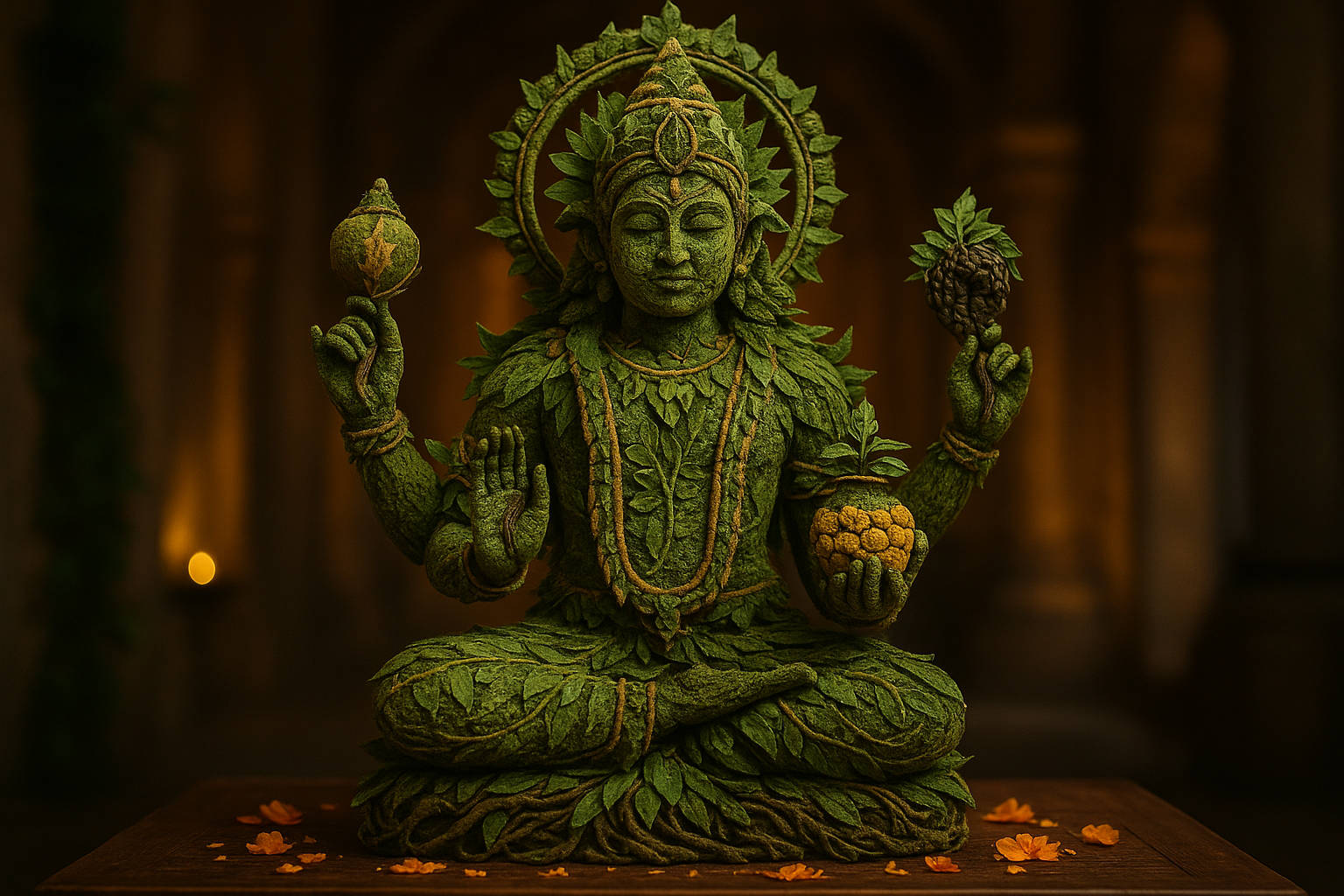
Dhanvantari: Origins of Ayurvedic Medicine
Lord Dhanvantari: The Divine Physician and Father of Ayurveda
Origins and Divine Birth
Lord Dhanvantari holds a revered position in Hindu mythology and Ayurvedic medicine as the divine physician of the gods and the originator of medical science. According to ancient texts, particularly the Vishnu Purana and various Puranas, Dhanvantari emerged during the famous Samudra Manthan (churning of the cosmic ocean) by the gods (Devas) and demons (Asuras) in their quest for Amrita (the nectar of immortality).
As the ocean was churned using Mount Mandara as a churning rod and the serpent Vasuki as a rope, various divine objects and beings emerged from the depths. Among these treasures, Lord Dhanvantari appeared carrying a pot of Amrita, embodying the essence of healing and longevity. He is considered an incarnation of Lord Vishnu, specifically manifested to preserve health and combat disease.

Iconography and Symbolism
Dhanvantari is traditionally depicted as a handsome, four-armed deity with a golden complexion. In his hands, he holds:
- Amrita Kalasha (pot of nectar) - symbolizing the elixir of life and immortality
- Medicinal herbs - representing natural healing
- Conch shell - signifying the cosmic sound and purity
- Chakra (discus) - representing the cycle of time and cosmic order
This iconography reflects his role as both a divine healer and a cosmic force maintaining the balance between health and disease.
Contributions to Medicine and Herbs
Foundation of Ayurveda
Lord Dhanvantari is credited as the founder of Ayurveda, the ancient Indian system of medicine that emphasizes holistic healing through natural means. His teachings form the cornerstone of this 5,000-year-old medical tradition that continues to influence wellness practices worldwide.
The Dhanvantari Samhita
Ancient texts attribute the Dhanvantari Samhita to him, which contains comprehensive knowledge about:
- Herbal medicine and plant-based remedies
- Surgical procedures and medical instruments
- Diagnostic techniques and disease classification
- Therapeutic practices including massage, yoga, and meditation
- Pharmacology and drug preparation methods
Herbal Wisdom and Plant Medicine
Dhanvantari's teachings emphasized the medicinal properties of herbs and plants, establishing principles that modern herbalism still follows:
- Rasa (taste) - Understanding how different tastes affect the body
- Virya (potency) - The heating or cooling effects of herbs
- Prabhava (special effect) - Unique properties beyond taste and potency
- Dosha balance - Using herbs to balance the three constitutional types (Vata, Pitta, Kapha)
Surgical Innovations
Beyond herbal medicine, Dhanvantari is also credited with advancing surgical knowledge, including:
- Cataract surgery techniques
- Plastic surgery procedures
- Wound healing methods
- Anatomical understanding
Cultural and Religious Significance
Dhanteras Festival
Dhanteras, celebrated two days before Diwali, is dedicated to Lord Dhanvantari. On this day, people worship him for health, prosperity, and protection from diseases. It's considered auspicious to purchase metals, especially gold and silver, and medical equipment.
Medical Ethics and Philosophy
Dhanvantari's teachings established fundamental principles of medical ethics:
- Ahimsa (non-violence) in treatment approaches
- Compassion as essential for healing
- Holistic care addressing mind, body, and spirit
- Prevention being superior to cure
Modern Relevance and Legacy
Contemporary Ayurveda
Today's Ayurvedic practitioners continue to invoke Dhanvantari's blessings and follow his principles:
- Integration of herbal medicine with modern healthcare
- Emphasis on personalized medicine based on individual constitution
- Preventive healthcare approaches
- Mind-body connection in healing
Global Influence
Dhanvantari's contributions have influenced:
- World Health Organization recognition of traditional medicine systems
- Integrative medicine practices combining ancient wisdom with modern science
- Pharmaceutical research into plant-based medicines
- Wellness tourism centered around Ayurvedic treatments
Educational Impact
Medical institutions across India begin their academic sessions with prayers to Lord Dhanvantari, and many medical colleges bear his name, recognizing his foundational role in healthcare education.
Conclusion
Lord Dhanvantari's legacy transcends mythology to represent the timeless pursuit of health and healing. His contributions to herbal medicine, surgical techniques, and holistic healthcare philosophy continue to guide practitioners worldwide. As modern medicine increasingly recognizes the value of traditional healing systems, Dhanvantari's vision of integrating natural remedies, ethical practice, and divine compassion remains profoundly relevant.
His emergence from the cosmic ocean symbolizes the eternal availability of healing knowledge to those who seek it with devotion and wisdom, making him not just a mythological figure, but a continuing source of inspiration for the medical community and all those dedicated to the art of healing.
Disclaimer: This article is for informational purposes only and does not constitute medical advice. Always consult with a qualified healthcare provider before starting any new supplement regimen, especially if you have existing health conditions or take medications.
Share








